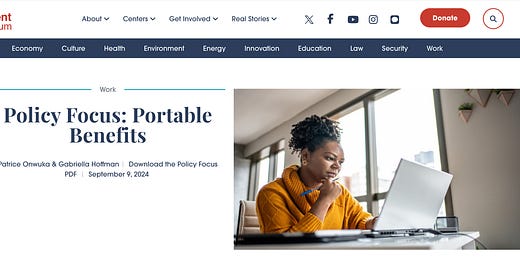This week, a new IWF Policy Focus I helped with on portable benefits was published. I assisted my IWF colleague, Patrice Onwuka, who heads up our Center for Economic Opportunity (CEO) in this policy paper.
I hope you check it out!
Traditional employment arrangements offer workers various types of benefits in exchange for their labor. Employers provide employees with wages or salaries and, typically, additional benefits such as health insurance, family benefits, paid time off, sick days, retirement plans, and disability insurance. Despite the addition of valuable benefits, this employment model has drawbacks for workers. Because employee benefits are provided through their employer, employees tend to lose access to those perks and essential providers when their employment is terminated.
Under this employment model, many benefits are also off-limits to self-employed or independent workers. The federal Fair Labor Standards Act (FLSA) prevents employers from offering benefits to independent contractors (i.e., non-employees) or those employers risk having to reclassify those workers as employees and may face hefty fines for “misclassifying” them. Freelancing and self-employment are longstanding work arrangements of the U.S. workforce, but innovation has also created new opportunities for independent work through apps and websites. Some 64 million Americans engage in freelance work today compared to 3.4 million in 1990. About half of freelancers are women, the majority of whom value flexibility as well as the income that independent work provides. Independent workers value the ability to work for whom they want, when, where, and how they choose; and they desire to maintain that independence and flexibility.





You might expect that the IRS would want employee/s to report firm/s that are hiring workers as contractors when they should be employees instead. However, the form the IRS provides for this purpose (the SS-8) is actually a full disclosure form. I.e., Jane Doe reports Contoso to the IRS, filling out the seven page form, and is in all probability (and unsurprisingly!) fired almost immediately. If the IRS *TRULY* wanted employees to inform them of which corporations were (possibly) breaking the rules, they would treat the reporting individuals as whistleblowers instead of the current posture: https://www.irs.gov/pub/irs-pdf/fss8.pdf